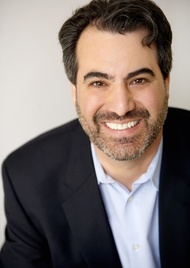By: Ron Pernick

As a father of 18-month old-twins, I don't travel as much as I used to. Which is probably a good thing for a number of reasons: it significantly reduces my carbon footprint; it allows me to be a supportive partner to my wife and hands-on father to my kids; and after years of wanderlust, it's letting me lay down deeper roots, and slow down a bit, in my new home town of Portland, Oregon. But, as an author, business owner, and engaged citizen, I still get to travel occasionally -- which is also a good thing: it helps get me "outside" of myself and opens me up to new connections, ways of thinking, and emergent possibilities. Case in point: As I write these words, I'm flying back from the EcoPower 2008 conference held in Florianopolis, Brazil, where I had the honor to give a presentation and to sit on a panel with Worldwatch Institute founder Lester Brown and former Greenpeace activist turned climate-change naysayer and nuclear-power advocate Patrick Moore. The event was principally designed to bring greater awareness of emerging global opportunities in clean energy, and the critical importance of sustainability in Brazil's development process, to politicians, businesspeople, investors, and NGOs. But, as is often the case, I'm guessing I walked away as engaged and challenged as the audience. On our panel, for example, we talked about the role of policy in hindering or enabling clean-tech growth, and about personal choices versus government mandates. In his presentation, Moore made the point that the government shouldn't tell people what car to drive or what home to buy, and in many ways I agree with him. Consumer choice is one of the pillars of our society. But, in my world view, that doesn't mean that governments don't have a significant role to play in ensuring that cars are safe and fuel efficient, that homes are green and conservation-oriented, and that individuals and companies "do the right thing." So, while I'm a believer in and supporter of the creative power of the marketplace, I also believe, more than ever, that governments have a crucial role to play in setting ground rules, creating checks and balances, and putting policies and subsidies in place that enable critical industries to flourish. Lighting up the Amazon In Brazil, one of the other new connections I made was with Fabio Rosa, a solar industry pioneer who's been leading the charge to bring solar power to fisherman, farmers, and others in remote regions for 25 years. In talking with him, I learned an important "little" thing about Brazilian import regulations that have a huge impact on the value proposition of solar in Brazil. Presently, the tariff on imported solar modules is around 60 percent. So, while Rosa and his dedicated team are doing their best to bring lighting, communications, and other basics of electricity to the rural poor, he's getting hit hard by a government policy that makes little sense. The reality is that Brazil doesn't currently manufacture any solar cells or modules in country - so there's no case to be made for protecting a regional industry. Penalizing an imported technology that offers a country like Brazil so much, just doesn't pencil out. Like any great innovator, Rosa has found a unique workaround to the vexing tariff issue and is helping make solar more affordable for people without access to significant capital. Instead of selling systems (which he still does in some cases), he's turned to leasing systems and selling electrons. This is a model that's become popular in the U.S. for power purchase agreements, but it's usually applied to larger commercial systems. By not selling the system, Rosa not only has figured out ways to make the monthly cost less than what a villager would pay for conventional options such as kerosene or candles. He's also able to lower the import tariff to around 10 percent, since Brazil has different tariff rates for items that are sold versus those that are not. I spoke with others in Brazil about this import-tariff issue. Sadly, but not surprisingly, it's just one of many obstacles facing clean- tech innovators in Brazil. But it leaves me wondering, what would it take for the Brazilian government to change some of these policies? After all, the country singlehandedly became the world leader in biofuels. More than 80 percent of new cars sold in the country are now flex-fuel vehicles that can run on both ethanol blends and petroleum-based gasoline, and so far this year the amount of sugar-cane-based ethanol sold in the country has exceeded that of petroleum gasoline (measured in gallons). What about solar? Why not eradicate the import tariff for clean- energy systems that can't be or aren't being produced in Brazil? What about a ten-year moratorium on such taxes regardless of where the panels are manufactured, in order to feed the exponential growth of the solar industry and bring lighting to millions of people throughout the rural areas and the inner-city slums (flavellas) of Brazil? As in the U.S., Europe, Asia, and elsewhere, clean-energy inequities loom large. But Brazil, perhaps more than any other country in Latin America, could shine a light that would spread across the Amazon and the continent. So, Muito Obrigado, Brasil. Thanks for opening up my mind to new challenges and new opportunities. I look forward to the possibility of working more closely with you and your people. ------------ Ron Pernick is cofounder and managing director of Clean Edge, Inc.; coauthor of The Clean Tech Revolution; and sustainability fellow at Portland State University's School of Business.

